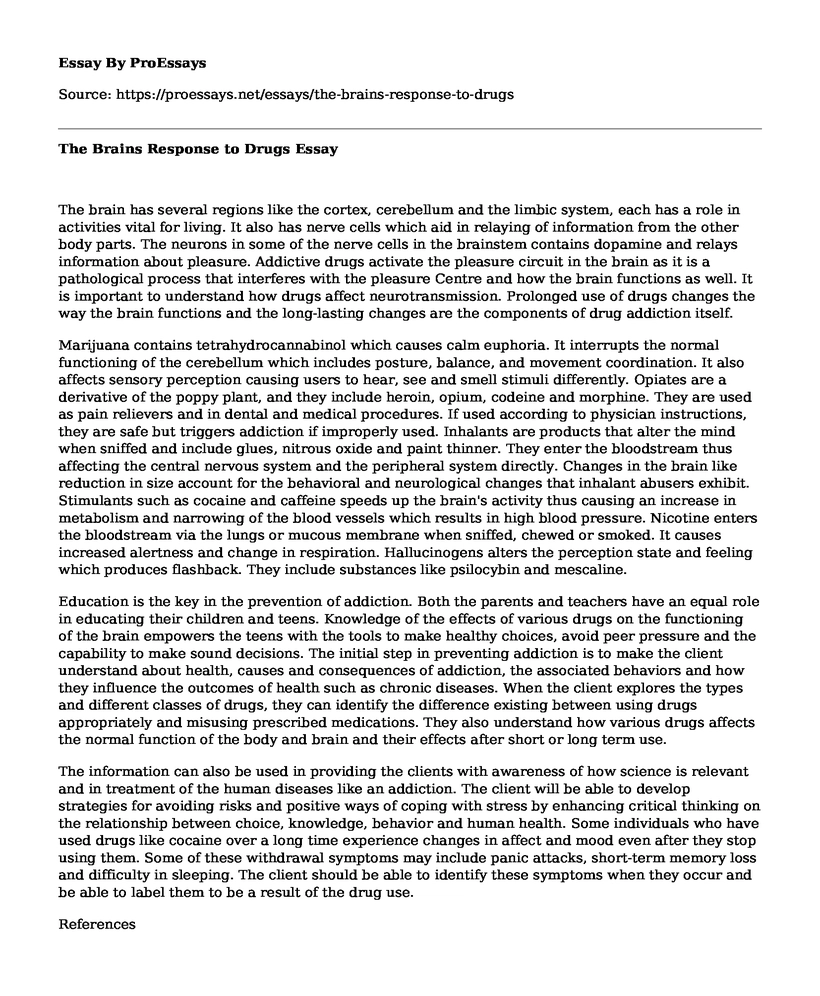The brain has several regions like the cortex, cerebellum and the limbic system, each has a role in activities vital for living. It also has nerve cells which aid in relaying of information from the other body parts. The neurons in some of the nerve cells in the brainstem contains dopamine and relays information about pleasure. Addictive drugs activate the pleasure circuit in the brain as it is a pathological process that interferes with the pleasure Centre and how the brain functions as well. It is important to understand how drugs affect neurotransmission. Prolonged use of drugs changes the way the brain functions and the long-lasting changes are the components of drug addiction itself.
Marijuana contains tetrahydrocannabinol which causes calm euphoria. It interrupts the normal functioning of the cerebellum which includes posture, balance, and movement coordination. It also affects sensory perception causing users to hear, see and smell stimuli differently. Opiates are a derivative of the poppy plant, and they include heroin, opium, codeine and morphine. They are used as pain relievers and in dental and medical procedures. If used according to physician instructions, they are safe but triggers addiction if improperly used. Inhalants are products that alter the mind when sniffed and include glues, nitrous oxide and paint thinner. They enter the bloodstream thus affecting the central nervous system and the peripheral system directly. Changes in the brain like reduction in size account for the behavioral and neurological changes that inhalant abusers exhibit. Stimulants such as cocaine and caffeine speeds up the brain's activity thus causing an increase in metabolism and narrowing of the blood vessels which results in high blood pressure. Nicotine enters the bloodstream via the lungs or mucous membrane when sniffed, chewed or smoked. It causes increased alertness and change in respiration. Hallucinogens alters the perception state and feeling which produces flashback. They include substances like psilocybin and mescaline.
Education is the key in the prevention of addiction. Both the parents and teachers have an equal role in educating their children and teens. Knowledge of the effects of various drugs on the functioning of the brain empowers the teens with the tools to make healthy choices, avoid peer pressure and the capability to make sound decisions. The initial step in preventing addiction is to make the client understand about health, causes and consequences of addiction, the associated behaviors and how they influence the outcomes of health such as chronic diseases. When the client explores the types and different classes of drugs, they can identify the difference existing between using drugs appropriately and misusing prescribed medications. They also understand how various drugs affects the normal function of the body and brain and their effects after short or long term use.
The information can also be used in providing the clients with awareness of how science is relevant and in treatment of the human diseases like an addiction. The client will be able to develop strategies for avoiding risks and positive ways of coping with stress by enhancing critical thinking on the relationship between choice, knowledge, behavior and human health. Some individuals who have used drugs like cocaine over a long time experience changes in affect and mood even after they stop using them. Some of these withdrawal symptoms may include panic attacks, short-term memory loss and difficulty in sleeping. The client should be able to identify these symptoms when they occur and be able to label them to be a result of the drug use.
References
Archives.drugabuse.gov,. (2016). NIDA - Publications - An Individual Drug Counseling Approach to Treat Cocaine Addiction. Retrieved 5 February 2016, from https://archives.drugabuse.gov/TXManuals/IDCA/IDCA10.html
Cite this page
The Brains Response to Drugs. (2021, Mar 06). Retrieved from https://proessays.net/essays/the-brains-response-to-drugs
If you are the original author of this essay and no longer wish to have it published on the ProEssays website, please click below to request its removal:
- Violence in Downtown Los Angeles Essay
- Trump's Immigration Policies Essay
- The Growing Role of Human Trafficking With ISIS in the 21ST Century
- Paper Example on Terrorism
- Essay Sample on Women in Combat
- Teenagers: Drug Abuse in Modern Societies - Research Paper
- Culture a Key Factor in Violence Against Women: Patriarchy Promotes Abuse - Essay Sample







